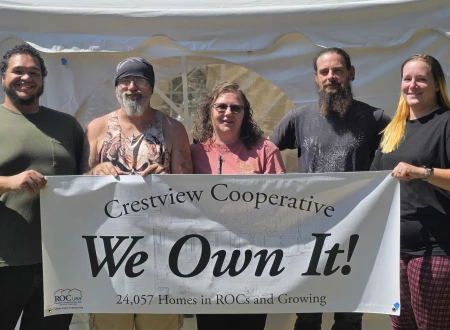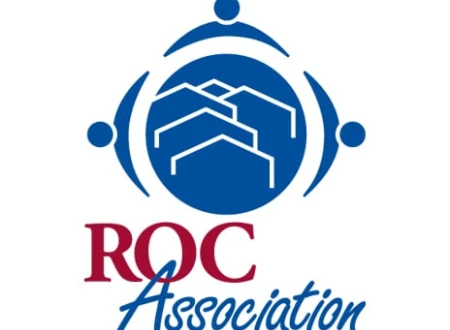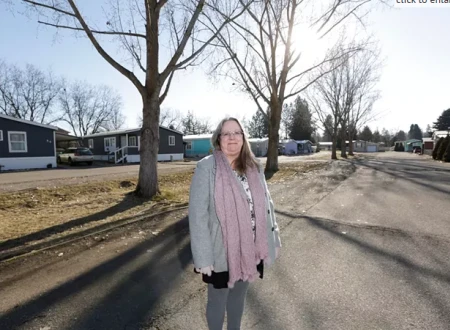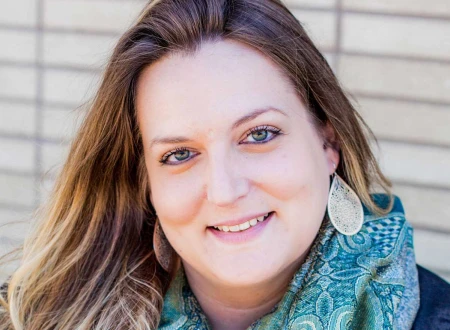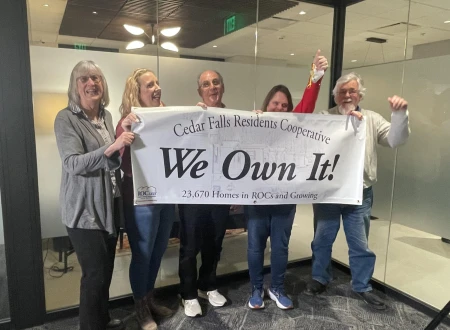 CONCORD, N.H. — In less than seven years, ROC USA® has built on a proven strategy of resident ownership in New Hampshire manufactured home communities and scaled it across the country, transforming communities and building a network of 10,000 secure and affordable homes with partners in 14 states.
CONCORD, N.H. — In less than seven years, ROC USA® has built on a proven strategy of resident ownership in New Hampshire manufactured home communities and scaled it across the country, transforming communities and building a network of 10,000 secure and affordable homes with partners in 14 states.
ROC USA is a nonprofit social venture dedicated to making quality resident ownership of manufactured home communities (aka “mobile home parks”) possible nationwide. It works to provide democratic homeowner organizations with the opportunity, training and financing to purchase and manage their communities.
Founding President Paul Bradley said ROC USA strengthens the local ownership of communities with the scaled resources and efficiencies of a national organization, coupled with the regional support of a network of regional certified technical assistance providers.
“Ten-thousand homes is a significant milestone — it’s the equivalent of a good-sized town,” Bradley said, noting that if ROC USA were a community owner, it would boast the 12th-largest portfolio in America. “But our communities are resident-owned, resident-controlled and based on a model that preserves and improves affordable communities while building assets for low- and moderate-income families and individuals.”
Bradley said he knew that ROC USA would be successful because of resident ownership’s spotless track record in the Granite State, led by the New Hampshire Community Loan Fund since 1984. That’s when the Community Loan Fund, where Bradley worked as vice president before launching ROC USA in 2008, helped 14 homeowners form the Meredith Center Cooperative and launch a movement.
“When we started, we didn’t know there was a systemic problem for homeowners who don’t control the land under their homes. We simply worked to find a way to keep 14 families from losing their homes,” said Community Loan Fund President Juliana Eades, who at the time was its sole employee. “Seeing resident ownership grow in New Hampshire to now 113 communities and spread to 13 other states through ROC USA’s work is tremendously rewarding.”
ROC USA includes two wholly-owned subsidiaries: ROC USA Network and ROC USA Capital. ROC USA Network is made up of eight certified technical assistance providers — nonprofit organizations that provide on-the-ground organizational development in each ROC USA community. These trainers work with resident groups from the first meeting following notice of a community sale through the purchase process and for at least the life of the group’s mortgage. They train Board officers, help navigate renovation and rehabilitation projects, and work to make the community self-sufficient and strong.
Cooperative Development Institute (CDI) is one such organization. CDI, a nonprofit 501(c)3 founded in 1994, has been a ROC USA Certified Technical Assistance Provider since 2009. Its mission of building a cooperative economy in the Northeast has been greatly advanced since joining the ROC USA Network. CDI has helped roughly 20 communities achieve resident ownership and work with several previously established co-ops, totaling more than 2,000 homes in its five-state region. As more and more co-ops are created, CDI and ROC USA are facilitating the creation of networks that increase the benefits of cooperation.
“The Cooperative Development Institute is immensely pleased to have participated in the preservation of the ROC USA Network’s 10,000th affordable home,” said Noémi Giszpenc, CDI’s executive director. “Each and every one of those homes is important — they represent a family’s security. We look forward to growing our work and offering this basic opportunity of safe, secure, affordable land tenure to thousands and thousands more homeowners.”
ROC USA Capital is a U.S. Department of Treasury-Certified Community Development Financial Institution. Its sole line of business is making pre-development, purchase and construction loans to resident-owned communities that work with a ROC USA certified technical assistance provider. Since 2008, it has made nearly $100 million in purchase loans alone.
Bradley said it’s that combination of ready financing and ongoing technical assistance that sets ROC USA apart and has made it so successful.
“With resident ownership, the homeowners in our network know their homes — their largest assets — are secure,” he said. “That stability fosters a new wave of reinvestment in Members’ homes, the community in general, and an increase in camaraderie that really transforms a group of houses into a neighborhood.”
Cooperative ownership of mobile home parks as a way of preserving affordable communities is a priority for several national non-profit organizations that in 2008 formed ROC USA to make resident-owned communities viable nationwide. ROC USA is sponsored by NeighborWorks® America, Capital Impact Partners, the Corporation for Enterprise Development (CFED), and the Community Loan Fund.
Since launching in 2008, ROC USA has helped a resident group purchase its community once every 32 days on average. Turnpike Park Cooperative Inc. in Westborough, Mass., recently refinanced its purchase with ROC USA Capital. The 46 homes in the Boston MetroWest community bring the total number of homes in ROC USA communities to 10,017.
“We have the actual water, sewer and road resurfacing project to complete now so we have another hurdle to overcome,” said Scott Knox, president of the co-op’s board of directors. “But by working together, we will all make it through to the end and have a beautiful functional cooperative to show and be proud of.”
The eight certified technical assistance providers with which ROC USA partners are equipped to work in 23 states. They are: CASA of Oregon; ROC Northwest (Olympia, Wash.); NeighborWorks Montana; UROC (Salt Lake City); Northcountry Cooperative Foundation (Minneapolis); PathStone Corporation (Rochester, N.Y.); Cooperative Development Institute (Shelburne Falls, Mass.); and ROC-NH (a program of the New Hampshire Community Loan Fund).

